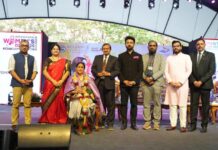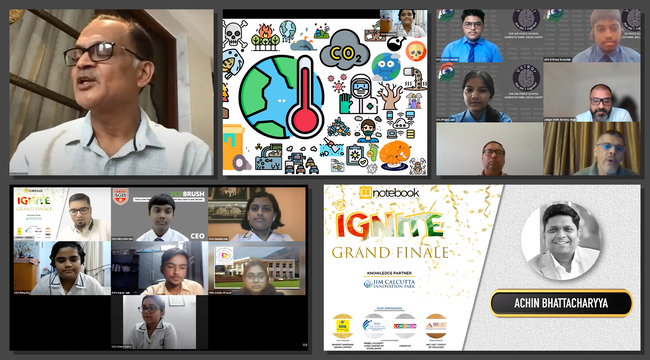New Delhi, December 31, 2020: Room to Read, the pioneer organization in imparting quality education to underprivileged children and strengthening gender equality, is celebrating its 20th anniversary across the globe.
An international non-profit with its headquarters in San Francisco, USA, and operations across sixteen countries of Asia and Africa, Room to Read’s two decades journey has only cemented its core belief that World Change Starts with Educated Children. Its innovative model focuses on profound, systemic transformation within schools in low-income communities during two time periods that are most critical in a child’s schooling: early primary school for literacy acquisition and secondary school for girls’ education. The organization collaborates with governments and local communities to develop literacy skills and a habit of reading among primary school children and ensure girls can complete secondary school with the skills necessary to negotiate key life decisions. Since its inception in the year 2000, Room to Read has benefited nearly 20 million children worldwide.
Room to Read India is the organization’s largest area of operation, with current presence across nine states in the country. In India, the organization has benefitted over 4.3 million children and distributed more than 100 million culturally relevant age appropriate books. It hopes to reach over 10 million children by 2024, depending on government collaborations and fund availability.
Room to Read’s programs have shown high impact. Children going through its comprehensive foundational literacy program has been found to be reading three times faster and two times more comprehension/understanding by the end of grade 2, compared to other non-intervention schools. Similarly, Room to Read’s life skills inputs to girls have been proven to reduce girl’s school dropout by 20% while enhancing their skills of problem solving, decision making, relationship building and expressing agency over one’s life. These are significant achievements in view of the National Education Policy 2020’s focus on foundational learning and life skills.
This impact, and the quality of Room to Read interventions have been widely acknowledged by governments, academics, donors, teachers and the communities that it serves. Prime Minister Narendra Modi, on his visit to aRoom to Read supported school in Varanasi in September 2018, remarked, “Room to Read through its methods has inculcated the habit of reading and developed an interest in reading amongst children. I saw that students from early grades were able to read confidently.” Chief Ministers and Education Ministers of states like Chhattisgarh, Delhi, Telangana, Rajasthan and Uttarakhand have also visited and acknowledged the work done by Room to Read.
On the occasion to mark its 20th anniversary Sourav Banerjee, Country Director, Room to Read India remarked “I want to extend my gratitude to every member of the organization for their hard work and dedication and to all the funding partners for their support. As we set our strategy for the next five years, we are sharply focused on supporting system-level adoption and influence to build a path toward greater scale. We will continue to deliver high-quality programs at the school level and help individual girls succeed. Our aim for the next five years will be to more than double the number of children benefited in the past 20 years”.
Room to Read’s Covid response
At the onset of the global Covid pandemic, as schools shut down, Room to Read quickly pivoted its activities to reach out to its beneficiaries through distant means. To make sure little children have education continuity and maintain reading habits during pandemic, the organization developed Read Aloud videos of story books, audio activities for children and their parents, toll free IVR for story listening, and specially curated Radio and TV episodes for early grade learners. In a few states, a Mobile library van with colorful books were moved around in far flung areas with low mobile connectivity. For addressing the digital divide, a learning kit, comprising of story cards, worksheets, parent’s guide and stationeries was also provided to children.
For the girls of the Girls Education program, online life skills content was delivered over digital medium and radio/ community radio. This was supplemented through self-instructional life skill materials (newsletter, comic books) delivered both online and in physical form. Girls were also provided with reading materials, stationery and hygiene kits to meet their health and education needs, and to keep them motivated to continue with their education.
In order to keep the focus on education continuity during the pandemic and prevent children from dropping out, Room to Read launched several online and offline campaigns during this period. The ‘India Gets Reading’ campaign (Aug 15- Sept 8) focused on promoting reading among children and reached out to children, teachers and parents across nine states with physical and online books and reading materials. The ‘Har Kadam BetiKe Sang” campaign (Oct 11- Nov 30) focused on girls’ education and reached out to parents and community to pledge their support to girl’s education. The campaign used a multimedia approach and was very well received by government officials and community members. These campaigns were supplemented through various state and national level discussions and webinars to create awareness on the issues of early literacy and girl’s education respectively.
Currently Room to Read, in partnership with NDTV, is running a television campaign “Education Endures-Back to School” rallying to bring back all children to school after the pandemic.
Corporate Comm India (CCI Newswire)

































